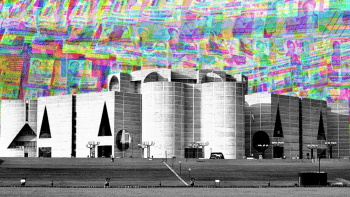The game of politics is like a Test match, not T20

Awami League General Secretary Obaidul Quader speaks to the media almost every day, and the BNP, quite predictably, is one of the key topics he addresses. Sometimes he is funny, sometimes he makes interesting points. One such comment caught my attention, because it is significant in the face of the upcoming parliamentary elections. On Monday, Quader said although BNP was yet to show any interest in taking part in the next general elections, many leaders of the party were secretly preparing for the polls. He said many BNP leaders and activists were communicating about the elections. "Among you [BNP leaders], there are many leaders like Ukil Abdus Sattar [Bhuiyan]. Many leaders are looking for a way to participate in the elections and are communicating secretly. Wait and see."
There are two points to consider in Quader's comment: one is that some BNP leaders may leave the party and take part in the upcoming elections; and the second – and possibly more important – point is that they are communicating secretly. Although he did not mention with whom, the hint was obvious: it's with the ruling party, as he said there are many like Ukil Abdus Sattar – who broke away from the party to contest the by-election to Brahmanbaria-2 constituency independently – in the BNP.
Let's look at the first point. The BNP has been out of office for nearly 17 years. This is the longest period for the party's leaders and activists to remain out of power since the party was founded. Apart from that, the face of the party, party chief Khaleda Zia, has remained inactive in party affairs since 2018, and the party's second-in-command, Tarique Rahman, has been in London since 2008. So, it was a difficult task for the party to keep its leaders and activists united. And it is no secret that the ruling party of the day always wants to split the opposition through various means. So far, the BNP has been successful to cope with such tactics as none of the stalwarts have abandoned the party.
But this time, it is rather challenging. To make the general elections credible, the Election Commission as well as the government will try to convince the BNP to participate in the elections. Since the BNP said it would not do so under the incumbent government, it would not be surprising if anyone left the party to contest in the elections as an independent candidate.
There are two reasons for this. First, almost all the prospective candidates of the BNP are facing a number of cases, and many want to get rid of them and return to normal lives. Leaving the party and contesting the elections as independent candidates may be a good way out of that situation. The second reason is that there are significant grievances in the party as many did not get expected posts and many have been cornered within the party for quite a long time. So, the ruling party might cash in on those grievances. It will serve two purposes simultaneously – splitting the party and making the elections seemingly inclusive.
So, if the BNP does not contest the elections and fails to convey its message properly to the grassroots, the party may face trouble, even if, so far, it has remained intact.
The second point of Quader's comment is that there are many Ukil Abdus Sattars in the BNP who are communicating secretly. We all know how a seasoned BNP leader like Ukil Abdus Sattar Bhuiyan got elected in the Bramanbaria-2 by-polls. The ruling party exercised their maximum strength to ensure the victory of Abdus Sattar (who was elected five times with the BNP ticket and was a technocrat minister during the BNP-led four-party alliance government in 2001-06).
But would it be that easy in case of general elections? In each constituency, there are a number of ruling party candidates. And we have seen how the ruling party suffered in the various local government elections due to infighting and intra-party rifts. Now, the question is whether the local Awami League leaders who are aspiring candidates would sacrifice themselves in favour of BNP leaders in their constituencies, where they have been working for years.
The BNP has said clearly and repeatedly that it will not take part in the elections, and that if anyone wants to do so by leaving the party, they can. Now, if the ruling party wants to split the BNP and coax a section of its leaders into joining the polls, then it will be the ruling party that will lose in the long run. Sure, politically the ruling party will get some mileage, but in the longer term, politics will be polluted and it will have to face even more disgruntled members, some of whom may decide to turn away when presented with a similar opportunity. This is the sort of horse-trading that we don't want to see.
The game of politics is like a Test match, not T20.
Mohammad Al-Masum Molla is chief reporter at The Daily Star.


 For all latest news, follow The Daily Star's Google News channel.
For all latest news, follow The Daily Star's Google News channel. 





Comments